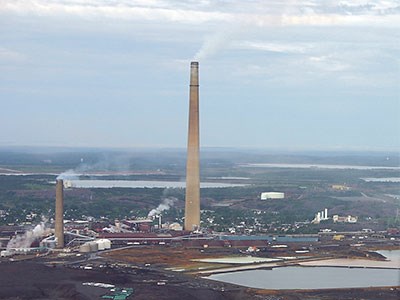Installation of a converter at Vale’s Copper Cliff smelter in Sudbury, a major component of the company’s Clean AER Project, is nearly complete. The converter is the first of four converters to be replaced as part of the $1-billion project that will see sulphur dioxide, dust and metals emissions reduced by 85 per cent from current levels.
Citing volatile market conditions and cost challenges, Vale announced in January that it was scaling back the cost of its Clean AER (Atmospheric Emissions Reduction) project from $2 billion to $1 billion.
At the same time, Vale indicated it would move to a single-furnace operation from a two-furnace operation.
Although a significantly less investment, Vale said that the environmental impact would be greater, by reducing emissions substantially more than previously anticipated.
“The original Clean AER project’s scope was designed for a two-furnace operation so it meant that when we made the decision, we had to go back and rescope the project to accommodate the one furnace,” said Vale spokesperson Angie Robson.
Vale doesn’t anticipate moving to a single furnace before 2016.
A team was formed to study various aspects of the change and revise plans to accommodate the change to a single furnace.
“Since (January) there’s been a lot of work done to rescope the project,” said Robson, “and that’s still ongoing.
“There are a lot of technical changes that have to be made. There’s a whole team in the process of doing that work now. And that should be done towards the end of the year.”
Some work has since been eliminated to accommodate the change to one furnace. Vale’s original plan involved constructing a second acid plant but with a one-furnace operation, that component is no longer necessary. However, the project is still making progress, added Robson.
“A lot of the work on the project that would be independent of the move to one furnace has still gone forward. For example, we’ve been working on the installation of our No. 8 converter.”
Robson said installation of the said converter is 90 per cent complete and she expects the system finished soon.
“The sulphur dioxide that now goes up the stack from our converter aisle will now be captured and sent to our acid plant,” she said.
“So the installation of this new No. 8 converter is part of the project.”
Upgrade work in the smelter to reduce nickel particulates is also moving forward. Other aspects of the project, including an adjusted timeline, are being reviewed.
Vale originally estimated that the project would employ some 1,300 people, but since scaling back has yet to amend that prediction.
“Obviously now that the scope of the project has been reduced somewhat we can expect that there will be less labour (needs); however, it’s still a $1-billion massive project and it’s certainly going to create a lot of jobs,” said Robson.




